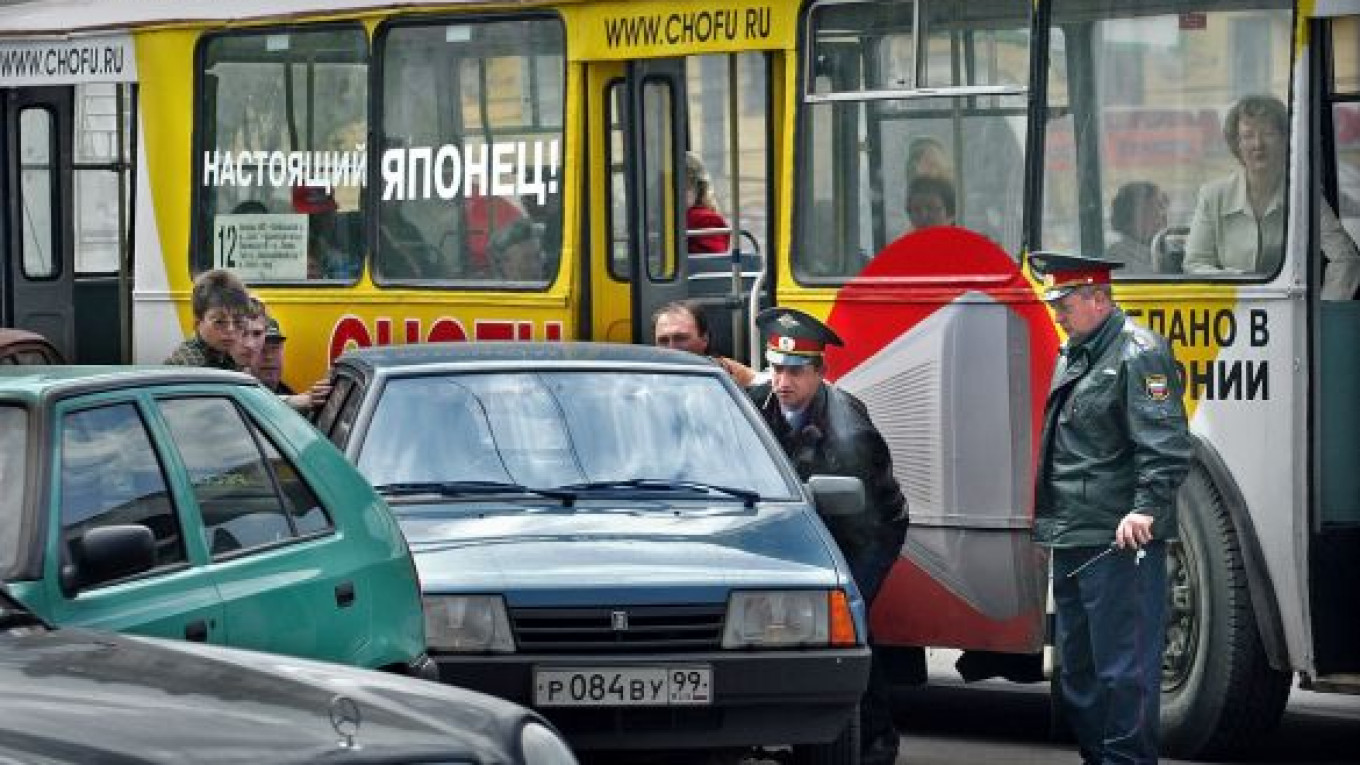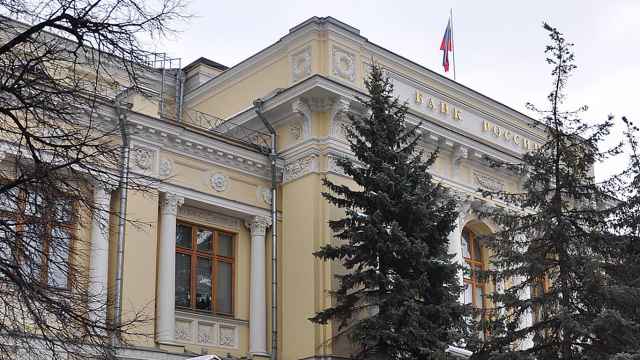About a decade ago, Sergei Moiseyev became so fed up after enduring years of hair-raising driving experiences in his job as a salesman that he enrolled in a driving school that offered lessons on how to cope on Moscow's roads.
He liked what he learned so much that he quit his job and became a teacher.
"Like all salesmen, I was trying to reach as many customers in a single day as possible. So I was driving fast on pretty bad roads and from time to time found myself in pretty dangerous situations," Moiseyev said.
It's a decision that might have saved his life. Russia annually suffers almost twice as many road deaths per capita as the United States according to World Health Organization figures.
But it also saved him money and an untold number of hours in police and insurance company offices. Corporate fleet managers estimate that even the most harmless fender-bender costs at least $1,000 and three days of man-hours — not counting lost earnings or missed sales.
And more and more businesses are tuning into the idea of equipping employees with the skills to cope with Moscow's legendary traffic — even as drivers buy licenses on the black market.
In 2001, Moiseyev left the school and set up the Active Security driving school, which focuses exclusively on teaching drivers how to avoid and deal with the recklessness of other drivers.
At first, he specialized in "active defense" — the kind of split-second decisions that can save a driver's life as an accident unfolds. But while the courses proved popular with individual drivers — especially men — he soon realized that not everyone is a James Bond waiting to happen.
So he expanded into "defensive driving," which involves constant alertness and being able to recognize in advance typical situations that can lead to accidents.
"If you can spot a dangerous situation earlier, you can react calmly, thoughtfully, and without that knee-jerk urgency," he said.
Individual drivers found such training less fun — but corporations pricked up their ears.
Today Moiseyev's business caters almost exclusively to the corporate sector, with clients including BP, Shell and , and he has teachers and freelance instructors in cities including Moscow, St. Petersburg and Yekaterinburg. He's even opened a subsidiary in Kazakhstan.
Danger on the Road
Officially, Russia's roads are getting safer.
In 2004, some 34,000 people were killed on the country's roads, according to police figures. In 2010 that figure was 26,567 — a drop of 23 percent in six years.
Moscow suffered 11,757 accidents in 2010 and 762 fatalities, according to police figures. That's down from 14,018 accidents and 1,103 deaths in 2005.
In fact, said Natalya Agre of Zavod, a consulting company that has produced several road safety campaigns for the traffic police, Russia is "one of the leading countries in terms of reducing death rates on the roads, well ahead of almost all European and Asian countries, the United States and Australia."
"Personally, I think it has got a bit better — not as quickly as we might like, but I think things are slowly improving," Moiseyev said.
Cutting accidents saves lives, of course. But for many companies there is also a strong economic incentive.
"It costs a total of $360 to $370 a day to keep a salesman on the road, taking into account salary, insurance, petrol and other costs," said Andrei Trifonov, head of Philip Morris' corporate fleet in Russia.
"If a driver has an accident he will have to spend a minimum of three days with the traffic police to make statements and get the right documents for an insurance claim. That's $1,000 wasted right there," he pointed out.
And that doesn't include a likely 10 percent insurance premium hike if the police find the driver to be responsible for the accident.
Like many multinational companies, Philip Morris runs its own internal fleet safety program — but it has turned to Moiseyev as a consultant to help adapt its course to "Russian realities."
"It's things you don't usually notice, but then you recall times when that has happened to you — like a pedestrian appearing from in front of a stopped trolleybus," said Trifonov, who manages a countrywide fleet of more than 1,000 vehicles.
Another tip is simple — take nothing for granted.
"In Europe, for example, if you see a green light at a crossroads you assume you can just drive straight through," Trifonov said. "Over here you can't assume anything — a driver could come from behind and turn in front of you."
Another tip for expat drivers is to be ready for drivers of even the toughest-looking SUV to suddenly slow to a three-kilometer-per-hour crawl when approaching tram lines or level crossings.
Moiseyev has seen his business boom in the past few years as word gets out about his school and the idea of corporate fleet training gains a certain fashion in the corporate world.
But the economic calculus still has to make its way across a cultural divide.
Moiseyev said practically all of his clients are Western firms or their Russian subsidiaries that tend to have a "more mature" attitude to safety issues.
Idiots and Roads
"It's already a cliche, but its true. Russia has bad roads," Sergei Udalov, director of the Avtostat research agency, said when asked about the main cause of accidents. "It's the No. 1 cause of crashes in this country."
But after roads comes a "cultural problem." "People just have a lax attitude to safety," he said.
Drunk driving caused 11,845 of all accidents in 2010 — more than 10 percent — killing 1,954 and injuring 17,280.
Agre claims a high-profile television advertising campaign managed to bring down road accidents caused by drunk drivers by 75 percent in five months in 2009.
One of Agre's upcoming public awareness campaigns for the traffic police will be to push for "passengers rights" and the introduction of seatbelts in minibuses and coaches, as well as the replacement of aging mass transit vehicles. And she says a major problem is simply attitudes.
"In May we conducted a public opinion poll, and some of the responses were simply stunning. Only 2.4 percent of our countrymen believe that the transportation of children without a child seat is a serious offense, and only a quarter of respondents always carry children in car seats," she said in e-mailed comments.
"But success of social campaigns cannot be separated from the other work being done in the field of road safety," she added.
"It requires a powerful integrated approach to the problem: build new roads, improve vehicle safety requirements, work at the legislative level, introduce new rules of behavior for people on the road," she said.
Those in the know suggest that the integrated response has to include a change of attitude on the part of the authorities.
One road safety professional who asked not to be identified because of the nature of the subject attributed the success of the campaign against drunk driving to a zero-tolerance policy from the traffic police — meaning that the average bribe for getting off a drunk driving charge rose to a prohibitive 300,000 rubles.
The Moscow Times could not verify that figure.
Buying Licenses
But Moiseyev said the most serious result of the lack of a safety culture is a mental disconnect between the concepts of getting a license and actually learning to drive.
"There are a great number of new drivers on the road who have been taught at driving schools that do poor work," said Moiseyev, whose own company only deals with already-qualified drivers.
"There are some good schools, sure, but even if you want to learn to drive well it is difficult to find them because competition is based only on low prices. And low price means low quality," he added.
Officially getting a license is a rigorously policed procedure. Simply to start lessons you need a medical certificate confirming you are healthy enough and have good enough eyesight to get behind the wheel.
And to pass the test you actually need to pass four exams — theory and practice tests at the school you are studying at, and then police theory and practice exams to actually receive a license.
But in reality, buying a license is so often winked at that it is seldom seen as wrongdoing at all.
Word on the street is that prices depend on how many of the four exams you want to pay for, and at which police precinct you do your test.
One Muscovite said she was offered all four exams for 15,000 rubles ($520), slightly steep compared with other deals.
"It was $100," said Alexei, another Muscovite who bought his license about five years ago. "You hand the cash to the teacher at the private driving school. That ensures the traffic cop at the exam won't flunk you and will close his eyes to any mistakes."
That $100 can also buy a good deal of helpfulness. Alexei's examiner actually helped him when he made a wrong turn and let him go during the city test because he had a train to catch.
Others are less fortunate. "Those who didn't pay usually took the exam several times, and I think the cops flunked them — one delicate touch to his pedal, just once, was all it took, I was told."
"I did it half and half," said Tim, a 20-something Muscovite who ended up buying his license four years ago. "The theory I studied for and passed myself. But after taking the practical exam several times and being failed repeatedly, I decided to pay for it."
It is a national problem. One Novosibirsk native described sitting for a mass exam that only two people who did not pay failed — followed by a practical test that a police driver actually took on the applicants' behalf.
The Moscow traffic police provided statistics but did not respond to repeated requests to comment for this article.
A Message from The Moscow Times:
Dear readers,
We are facing unprecedented challenges. Russia's Prosecutor General's Office has designated The Moscow Times as an "undesirable" organization, criminalizing our work and putting our staff at risk of prosecution. This follows our earlier unjust labeling as a "foreign agent."
These actions are direct attempts to silence independent journalism in Russia. The authorities claim our work "discredits the decisions of the Russian leadership." We see things differently: we strive to provide accurate, unbiased reporting on Russia.
We, the journalists of The Moscow Times, refuse to be silenced. But to continue our work, we need your help.
Your support, no matter how small, makes a world of difference. If you can, please support us monthly starting from just $2. It's quick to set up, and every contribution makes a significant impact.
By supporting The Moscow Times, you're defending open, independent journalism in the face of repression. Thank you for standing with us.
Remind me later.






